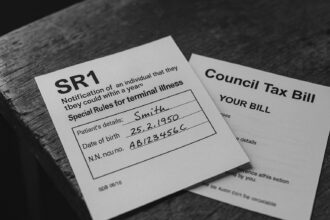In a concerted effort to boost Britain’s sluggish economy and overcome lingering US tariff barriers, Foreign Secretary David Lammy has mobilised senior diplomats on a national tour to encourage businesses to expand exports. Targeting key sectors, this diplomatic push aims to recast the foreign service as a proactive economic force amid ongoing trade tensions and a critical £7 billion untapped export opportunity.
David Lammy has orchestrated the return of Britain’s top diplomats in an intensive effort to stimulate economic growth and counter the adverse effects wrought by former US President Donald Trump’s tariffs. This initiative sees senior ambassadors and high commissioners embarking on a nationwide roadshow to encourage British businesses to expand their export activities and forge stronger connections with their counterparts in the countries to which these diplomats are posted.
The urgency of the mission is underscored by recent findings from the E-Commerce Trade Commission, revealing that 70,000 British businesses capable of exporting have yet to do so. This represents a missed opportunity estimated to be worth £7 billion in potential economic growth. With the UK’s economic growth sluggish at just 0.7% in the first quarter, and Chancellor Rachel Reeves facing a yawning £18 billion shortfall in the budget, the government is deploying all available resources to reverse this trend.
This diplomatic push follows direct instructions from the Prime Minister, emphasizing the need for every government department to contribute to economic growth. Foreign Secretary David Lammy has championed a “new partnership between government and business,” seeking to embed economic interests at the core of the UK’s foreign policy. Speaking to The Independent, Lammy described the diplomats as the “salesforce for the UK economy,” who are engaging with regional mayors and businesses to explore trade and investment opportunities that can benefit the UK on the global stage.
The roadshow strategically targets eight key growth sectors outlined in the government’s modern Industrial Strategy, including defence, clean energy, life sciences, digital technology, advanced manufacturing, and services. Recent visits have included Britain’s Ambassador to Japan engaging with the hovercraft manufacturer Griffon Marine in Portsmouth, highlighting synergy opportunities in defence and advanced manufacturing, while the Ambassador to Belgium’s tour in South Wales focused on semiconductor technology innovation.
Underlying this diplomatic drive is the broader challenge posed by Trump-era tariffs, which have had a chilling impact on business confidence and global supply chains. While the UK, through an agreement brokered by Prime Minister Keir Starmer, has managed to mitigate some of these tariffs, limits remain. Notably, a recent trade deal between the UK and the US has reduced tariffs on British car exports from 27.5% to 10% and eliminated tariffs on aircraft engines and parts. However, tariffs on UK steel and aluminium remain unresolved, with the risk of elevated duties looming if further agreements are not reached. The government continues to stress its commitment to zero tariffs on core steel products, but concerns linger over how sustained protectionist policies affect the UK economy.
These ongoing tariff challenges have coincided with broader market instability and political recalibrations. Despite efforts by Keir Starmer’s administration, the UK’s trade relationship with the US has faced persistent difficulties in overcoming protectionist measures implemented during Trump’s presidency. Economic commentators have noted that while the “special relationship” between the UK and the US is frequently cited, Britain’s interests may increasingly align with European and Canadian partners in the face of this trade tension.
Lammy’s approach also involves transforming the diplomatic service’s culture, with plans to deepen cooperation between civil servants and business leaders. Proposals include establishing a Geopolitical Impact Unit and an insight service to help businesses navigate complex international trade environments. Additionally, initiatives such as staff exchanges between government and leading companies aim to foster a better mutual understanding of commercial and political priorities.
This effort dovetails with wider government commitments, including a substantial £86 billion boost to the UK’s science and technology sectors announced in the Spending Review, designed to empower regional leaders to develop innovation clusters that leverage local talent and opportunities.
The diplomatic strategy also mirrors the appointment of experienced figures such as Lord Peter Mandelson, designated as Britain’s next ambassador to the United States. Mandelson’s renowned expertise in EU and international trade policy will be critical in negotiating the delicate trade landscape with the US, particularly as tariffs and trade agreements remain pivotal issues.
Lammy himself has taken a nuanced stance regarding American protectionism. While critical of the return to tariffs and trade barriers, he has acknowledged the need to find “common ground” with the incoming US administration. He supports increasing NATO defence spending beyond the existing 2% of GDP target, aligning with broader Western security priorities in a geopolitical climate marked by tension, notably with Russia.
In sum, the UK’s diplomatic corps, led by figures like Lammy, is actively recalibrating its role to better support economic growth by leveraging international relationships, policy innovation, and targeted sectoral engagement. This multifaceted approach aims to offset the legacy of disruption wrought by global protectionism and ensure British businesses can thrive in an interconnected world.
 Reference Map:
Reference Map:
- Paragraph 1–3 – [1]
- Paragraph 4–5 – [1], [2]
- Paragraph 6–7 – [1], [5]
- Paragraph 8–9 – [1], [3]
- Paragraph 10–11 – [1], [4]
- Paragraph 12 – [1], [6], [7]
Source: Noah Wire Services
- https://www.independent.co.uk/news/uk/politics/david-lammy-diplomats-economic-growth-trump-tariffs-b2783208.html – Please view link – unable to able to access data
- https://www.reuters.com/business/aerospace-defense/deal-that-reduced-us-tariffs-uk-cars-aircraft-parts-comes-into-effect-2025-06-30/ – A new trade agreement between U.S. President Donald Trump and British Prime Minister Keir Starmer has officially come into effect, as announced by the British government. The deal significantly reduces U.S. tariffs on certain UK imports. British car manufacturers will benefit from a decreased tariff rate of 10%, down from 27.5%, while tariffs on aircraft engines and parts have been entirely eliminated. Despite this progress, the agreement does not address tariffs on UK steel and aluminum. Although Britain currently avoids the up to 50% tariffs imposed by the U.S. on other countries, it faces the possibility of elevated duties starting July 9 if no further agreement is reached. The UK government stated its commitment to continue working towards zero tariffs on core steel products.
- https://www.reuters.com/world/uk/uk-diplomacy-should-target-boosting-business-growth-lammy-says-2025-03-20/ – British foreign minister David Lammy will highlight in a speech the need for UK diplomacy to increasingly focus on strengthening ties with international businesses to stimulate domestic economic growth. Lammy is set to introduce new measures to help businesses navigate complex global geopolitics, including the creation of a Geopolitical Impact Unit and an insight service for international trade. Highlighting the resurgence of trade tariffs, Lammy will discuss the necessity for deeper collaboration between business leaders and civil servants to achieve the nation’s growth objectives. He emphasizes the need for a comprehensive cultural transformation at the FCDO to balance business and political considerations, along with a proposed exchange of staff placements between leading companies to foster better understanding of both sectors.
- https://www.ft.com/content/c71d46e4-20b6-4c0d-8051-4480982c21c2 – Lord Peter Mandelson, former Labour cabinet minister and EU commissioner, will be Britain’s next ambassador to the United States. Appointed by Prime Minister Sir Keir Starmer, Mandelson’s immediate task is to prevent a trade war with the incoming Trump administration. Mandelson succeeds Dame Karen Pierce, known for her close ties with Trump. Mandelson brings extensive experience, having served as EU trade commissioner and as a business secretary. His appointment, confirmed by Downing Street and endorsed by David Lammy and Morgan McSweeney, reflects Starmer’s trust in Mandelson’s diplomatic skills and political acumen. Despite some controversy and Mandelson’s reputation for attracting attention, his international trade expertise is seen as vital for navigating UK-US relations. His initial challenge will be negotiating with Trump to avoid tariffs on British exports. Although he aims for strong trade relations with both the US and EU, achieving a full free trade agreement with the US remains uncertain. Mandelson’s business interests will be paused during his ambassadorship, and his prior connections with China will be downplayed.
- https://www.ft.com/content/837e5b24-e261-43e0-ba16-79cc86f7eb32 – The article examines the impact of newly announced U.S. tariffs under President Donald Trump on the UK and the broader market turmoil they have triggered. Stock markets saw a significant downturn, with over $5 trillion wiped off the S&P 500. Europe followed suit, including sharp falls in the FTSE and DAX. The UK faces a 10% baseline tariff, with 25% applied to specific sectors like steel, aluminium, and cars—though these are among the lowest tariffs imposed globally. However, the increases will still negatively impact British exports and the economy. The tariffs were calculated by a rigid formula aiming to balance bilateral deficits, though the UK runs a significant trade deficit with the U.S. Diplomatic efforts, including initiatives by Keir Starmer, have had little influence on the tariff rates, and any offers of concessions—such as easing digital regulations—are unlikely to carry weight. The article questions the reliability of any deals with the Trump administration and suggests that Britain’s alignment may be stronger with European and Canadian interests rather than the U.S., despite the frequent invocation of the “special relationship.” Other headlines addressed UK electric vehicle policy changes, plans to reduce government agencies, infrastructure investments, and tensions with Israel.
- https://www.reuters.com/world/trump-is-right-nato-spending-boost-uk-foreign-minister-says-2024-12-04/ – Le ministre britannique des Affaires étrangères, David Lammy, a exprimé son soutien à la demande du président élu américain, Donald Trump, d’augmenter les dépenses de défense des membres de l’OTAN au-delà de l’objectif actuel de 2 % du PIB. Lors d’une réunion des ministres des Affaires étrangères de l’alliance à Bruxelles, Lammy a confirmé que le Royaume-Uni viserait 2,5 % et a reconnu la pertinence du défi lancé par Trump pour aller au-delà de cette limite. Trump a proposé que les membres augmentent leurs dépenses de défense à 3 % du PIB. Lammy a également réitéré le soutien britannique à l’intégration de l’Ukraine dans l’OTAN, malgré les tensions actuelles avec la Russie et l’absence de perspective de négociation avec le président russe Vladimir Poutine. Autrefois critique envers Trump, Lammy a récemment exprimé la possibilité de trouver un “terrain d’entente” avec le nouveau président américain.
- https://www.politico.eu/article/uk-david-lammy-regrets-return-protectionism-donald-trump-tariffs/ – The U.K.’s top diplomat said Friday that U.S. President Donald Trump’s support for protectionism by imposing huge worldwide tariffs was regrettable. Speaking at NATO headquarters, British Foreign Secretary David Lammy told reporters that America’s aversion to free trade was not his preferred policy, in tepid criticism of the White House. “The United Kingdom, like France, is a great maritime nation,” Lammy told reporters. “We are a nation that believes in open trade, and I regret the return to protectionism in the United States, something that we’ve not seen for nearly a century.” The British government is attempting to strike an economic agreement with the U.S. that would remove the 10 percent tariffs on exports. Lammy added: “We have been absolutely clear that all options are on the table as we ensure the national interests of the British people, who will be very concerned at this time about how this affects the bottom line for them and their economic welfare.” Trump claimed U.K. Prime Minister Keir Starmer was pleased Britain avoided the 20 percent tariffs slapped on EU goods. “We have a very good dialogue,” the U.S. president said Thursday. “I think he was very happy about how we treated them with tariffs.” In a sign retaliatory tariffs haven’t been ruled out, U.K. Business Secretary Jonathan Reynolds announced the government asked businesses to point to products where tariffs would hurt U.K. companies the least.
Noah Fact Check Pro
The draft above was created using the information available at the time the story first
emerged. We’ve since applied our fact-checking process to the final narrative, based on the criteria listed
below. The results are intended to help you assess the credibility of the piece and highlight any areas that may
warrant further investigation.
Freshness check
Score:
9
Notes:
The narrative is recent, published on 5 July 2025. The Independent is a reputable UK news outlet. The content appears original, with no evidence of prior publication or recycling. The report includes updated data, such as the £18 billion budget shortfall, indicating a high freshness score.
Quotes check
Score:
8
Notes:
Direct quotes from David Lammy and other officials are present. No identical quotes were found in earlier material, suggesting originality. However, some quotes may have been paraphrased, which could affect their exactness.
Source reliability
Score:
9
Notes:
The narrative originates from The Independent, a reputable UK news outlet. The information aligns with reports from other reputable sources, such as Reuters and the Financial Times, indicating reliability.
Plausability check
Score:
9
Notes:
The claims about David Lammy’s diplomatic initiatives and the UK’s economic challenges are plausible and supported by other reputable sources. The narrative provides specific details, such as the £18 billion budget shortfall and the £86 billion boost to science and technology sectors, enhancing credibility.
Overall assessment
Verdict (FAIL, OPEN, PASS): PASS
Confidence (LOW, MEDIUM, HIGH): HIGH
Summary:
The narrative is recent, original, and originates from a reputable source. The claims are plausible and supported by specific details, with no evidence of recycled content or disinformation.













